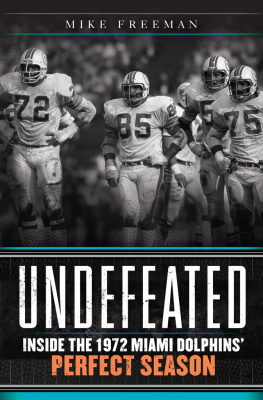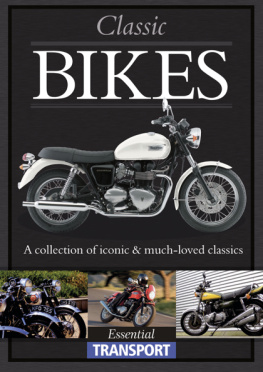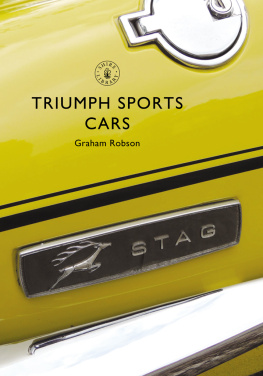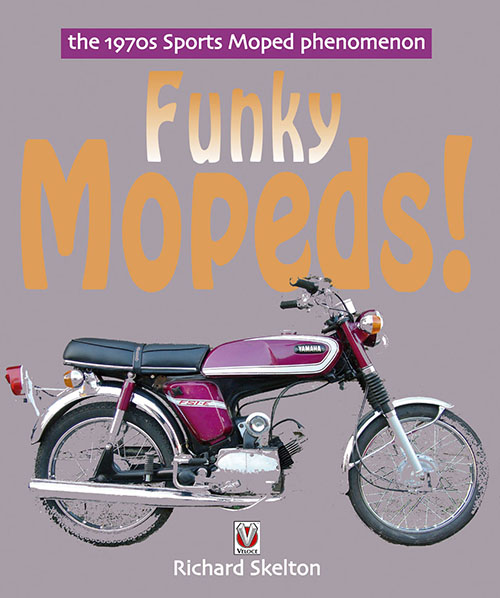First printed in paperback format 2004 & 2006. First published in ebook format 2011 by Veloce Publishing Limited, Veloce House, Parkway Farm Business Park, Middle Farm Way, Poundbury, Dorchester, Dorset, DT1 3AR, England. Fax 01305 250479/e-mail info@veloce.co.uk/web www.veloce.co.uk or www.velocebooks.com.
Ebook edition ISBN: 978-1-845844-80-6
Paperback edition ISBN: 978-1-845840-78-5
Richard Skelton and Veloce Publishing 2011. All rights reserved. With the exception of quoting brief passages for the purpose of review, no part of this publication may be recorded, reproduced or transmitted by any means, including photocopying, without the written permission of Veloce Publishing Ltd. Throughout this book logos, model names and designations, etc, have been used for the purposes of identification, illustration and decoration. Such names are the property of the trademark holder as this is not an official publication.
Readers with ideas for automotive books, or books on other transport or related hobby subjects, are invited to write to the editorial director of Veloce Publishing at the above address.
British Library Cataloguing in Publication Data A catalogue record for this book is available from the British Library.
Typesetting, design and page make-up all by Veloce Publishing Ltd on Apple Mac.
ACKNOWLEDGEMENTS
I would like to thank the following people for their help and co-operation, over the many months it has taken me to put this book together. Firstly, all the moped people, and in no particular order, Paul Simcox, Barry Moore, Chris Alty, John Powell, Russell Sears, Charlie Owens, John Dunn, Gerry Croxson, Steve Wilkinson, Chris Mahon, Neil Holland and Julian Kowalewski, Mark Wilson, Russell and Margaret Marsden, Peter Padgett, Terry Silvester, Brent Fielder, and Steve Fitzsimmons.
Other people who have helped me include Andy Betts, Dave Clark, Paul Clark, Andy Bishop, Ian Ritchie and Matt Chambers.
I am also grateful to Rod Grainger at Veloce Publishing for taking on the project. Finally, I would like to thank my dad for buying me my Yamaha FS1-E back in 1976, and getting me started in motorcycling.
Richard Skelton
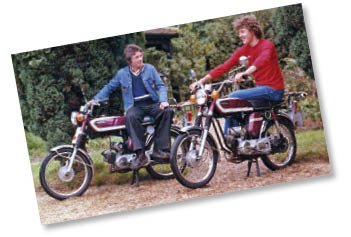
The author (left) and schoolfriend Andrew Bishop on their N- registration purple FS1-Es in 1977. Note the FS1-E DX bolt on downtubes on Andrews bike. (Courtesy Andrew Bishop)
INTRODUCTION
On 15 December 1971, Tory Transport Minister, John Peyton, changed British two-wheeler licensing regulations, and unwittingly created a market for a new breed of machines, which were produced by manufacturers from all over the world.
The infamous sixteener law wiped all 16-year-old motorcyclists off the road in an instant, forcing them to turn to mopeds. The law was intended to force novice bikers onto their grannies 50cc shopping bikes, or off the road altogether, thereby reducing accident statistics at a stroke.
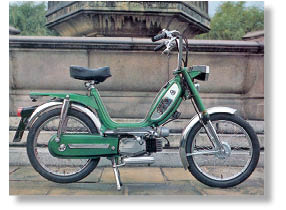
The Gitane Comfort VI Automatic the sort of moped the Government had in mind for sixteeners.
The Governments plan was successful at first, but soon market forces were at work. Manufacturers and importers realised there was a demand for real motorcycles, and produced more powerful models to meet it. Equipped with pedals, added as a token gesture to comply with the law, 50cc performance motorcycles were imported to the UK in increasing numbers from 1972. The sports moped had arrived.
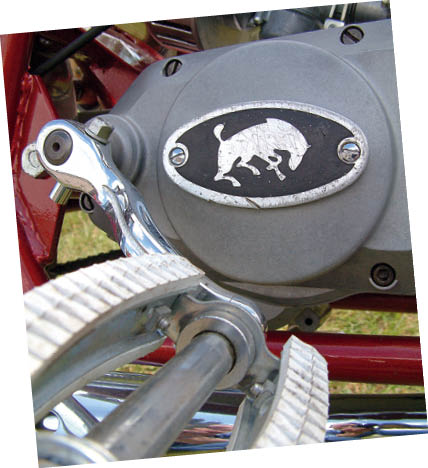
What it was all about - bicycle pedals added to 50cc motorcycles. Note Fantics prancing pony design, cheekily echoing Ferraris famous logo.
These sporty machines, soon dubbed sixteener specials, gave a first taste of freedom and independence to hundreds of thousands of teenagers. Ostensibly stopgaps for beginners itching to ride bigger bikes or learn to drive a car, these machines represented so much more to a generation of youngsters.
Bound together by the commonality of their machines, which was given away by their irrelevant and slightly embarassing pedals, these kids made their way through their first 12 months on the road enjoying camaraderie and rivalry, impressing their mates and girlfriends, and, above all, in their own eyes, looking impossibly cool. It was a happy and carefree time for many.
Despite learning the hard way about hazards such as car drivers blind spots, wet leaves under trees, and lorry diesel on roundabouts, it was a relatively safe motorcycling baptism. Most sports mopeds were hard pushed to exceed 50mph, which was nonetheless fast enough to keep up with town traffic, unlike the wobbly, slow step-through models the Government had wanted teenagers to ride. On top of this they had efficient brakes, and excellent handling and stability.
Stylish sixteener specials flooded into the UK from around the world. Moped roadsters, trail bikes, motocross bikes, cafe racers, and even choppers found their way onto the market, making the moped sector the largest sales category in motorcycling.
As ever, all good things come to an end. From 1 August 1977, a new legal definition of moped came into force, obliging manufacturers to warrant that their 50cc machines maximum speed in still air, and on level ground carrying a rider weighing 75kg (11st 11lb) does not exceed 30mph by more than five mph. Pedals were no longer necessary, and there was also an absurd maximum weight limit of 250kg.
The manufacturers responded with power restricted versions of their current models, and by producing attractive new designs meeting the new regulations, but to no avail. The moped was back in the gutter, and a huge drop in 50cc registrations helped boot motorcycle sales into the doldrums, bringing an end to the 1970s motorcycle boom.
Soon the supply of second-hand sports mopeds ran out, and around ten years after it began, the sports moped era fizzled out.
Thrashed, crashed, and ill-maintained by a succession of 16-year-olds, most sixteener specials ended up being scrapped or further abused as field bikes before eventually being left to rot away. However, a handful lying neglected in garages, sheds and barns survived into the 1990s, and started to become sought after by collectors and restorers.
Now the sports moped revival movement is in full swing, and many models have attained classic status.
An increasing number of enthusiasts are actively resurrecting, and preserving these rare machines. There is a network of spares outlets and suppliers, and a lively owners club. There are displays of concours restorations at classic motorcycle shows; a website devoted to the most popular model, historic registers have been drawn up, runs are held all over the country, and a museum is being planned. To quote collector Eamonn Maloney: Its men behaving sadly I suppose.
This book celebrates the phenomenon of the sports moped. It charts the history of the genre, and attempts to recapture the spirit and times of the 1970s seen through the eyes of a sixteener. In the book there is an illustrated guide to the many manufacturers, with colour photographs of the key models and many obscure examples are also depicted - if you have owned a sports moped, your bike will probably be in here somewhere!
This book also looks at the current bike scene, and includes stories of restorers and collectors - men enjoying owning again the bikes they rode when they were sixteen. Some ride their mopeds for fun, some use them sparingly on club runs and rallies, and others keep their lovingly restored machines in pristine, unused condition, bringing them out only for display at shows and exhibitions.



